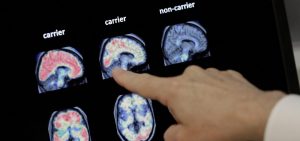News
The FDA Has Approved A New Alzheimer’s Drug — Here’s Why That’s Controversial
By: Scott Hensley | Jon Hamilton | Laurel Wamsley | NPR
Posted on:
WASHINGTON, D.C. (NPR) — The Food and Drug Administration approved the drug aducanumab to treat patients with Alzheimer’s disease on Monday morning. It is the first new drug approved by the agency for Alzheimer’s disease since 2003.

The drug has proved highly effective at reducing the plaques, called beta amyloid, that build up in the brains of people with Alzheimer’s.
But two large studies offered conflicting evidence about whether the treatment slows declines in memory and thinking. A panel of expert advisers to the FDA recommended in November that the agency not approve the drug.
As a condition of approval, the FDA is requiring Biogen, the drug’s maker, to conduct another clinical study to confirm that the reduction of amyloid plaques results in clinical improvement for patients. If the subsequent study doesn’t show a clinical improvement, the agency could move to withdraw the approval.
The medicine will be marketed under the trade name Aduhelm.
The FDA acknowledged the controversy and attention the drug’s approval has garnered from the Alzheimer’s patient community, elected officials and others.
The agency opted to put Aduhelm on the FDA’s Accelerated Approval pathway, which is meant to speed access to potentially valuable therapies for patients with serious diseases to serve an unmet need, and where a clinical benefit is expected — even if there is still some uncertainty about that benefit.
“[T]he Agency concluded that the benefits of Aduhelm for patients with Alzheimer’s disease outweighed the risks of the therapy,” FDA Center for Drug Evaluation and Research Director Patrizia Cavazzoni said in a statement.
It could take several years to conclude the clinical trials the FDA is requiring. But in the meantime, Aduhelm will be available to patients.
Patients will receive the drug in monthly infusions. They will also need regular brain scans to detect a rare side effect: bleeding or swelling in the brain.
Biogen and Eisai, the companies marketing the drug, have yet to announce how much it will cost.
The Alzheimer’s Association, which has been pushing for approval, applauded the news.
“This is the first drug that slows Alzheimer’s disease. And, this is the beginning of a completely new future for Alzheimer’s treatments,” it said in a statement. “This is a new type of Alzheimer’s treatment; it addresses the disease in a way that has never been done before, compared to currently approved drugs.”
9(MDI4ODU1ODA1MDE0ODA3MTMyMDY2MTJiNQ000))

